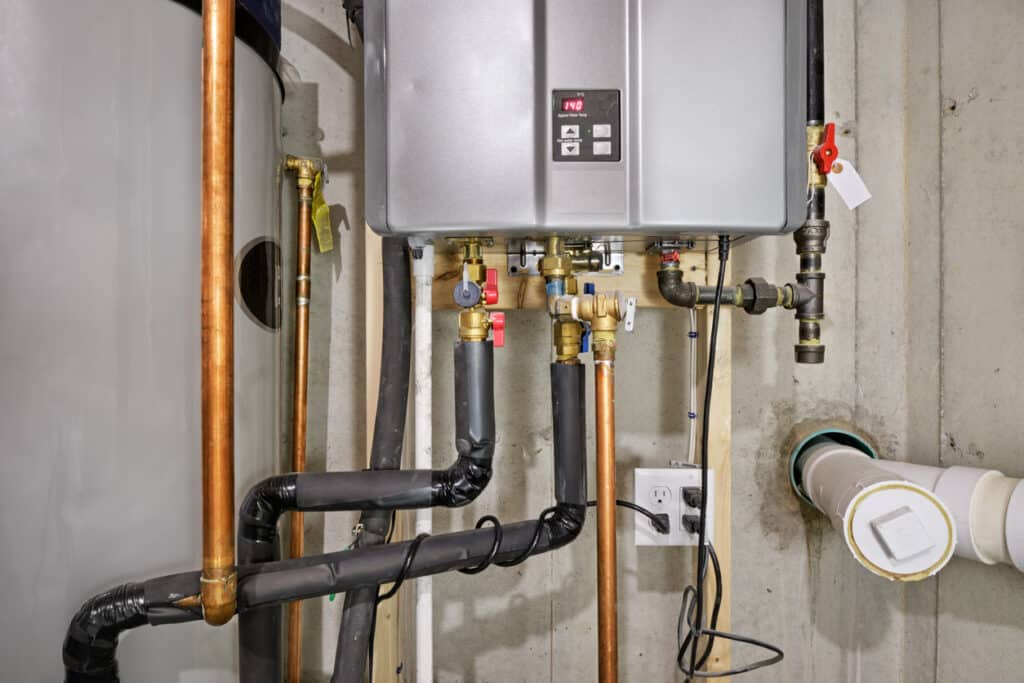Endless Hot Water, Energy Savings, and Space Efficiency
Frustrated with running out of hot water? Could a whole house tankless water heater be your solution?
At Clarksburg Plumbing, we specialize in providing top-notch plumbing services, including the installation of a whole house tankless water heater, to residents in North Bethesda, MD.
Choosing the right water heating system can significantly impact your home’s comfort and energy efficiency.
Let’s explore why switching to a whole house tankless water heater could be one of the best decisions for your home.

What is a Whole House Tankless Water Heater?
A whole house tankless water heater is a modern water heating solution designed to provide an endless supply of hot water on demand.
Unlike traditional tank water heaters that store and continuously heat a large volume of water, tankless models heat water directly as it flows through the unit.
This process involves either gas burners or electric elements heating the water as it passes through the system, ensuring you only use energy when hot water is needed?.
Comparison with Traditional Tank Water Heaters
Continuous Hot Water Supply:
Traditional tank water heaters often face the limitation of running out of hot water during high-demand periods.
This can be particularly inconvenient when multiple showers, laundry, and dishwashing are happening simultaneously.
The finite capacity of a tank means once the hot water is depleted, you must wait for the tank to refill and reheat, which can be frustrating during peak usage times.
Whole house tankless water heater will heat water on demand as it passes through the unit, ensuring that you never experience a cold shower again.
Whether you are running multiple appliances or have a large family, a whole house tankless water heater can meet high hot water demands without running out??.
This is particularly beneficial for homes with high usage patterns, as it enhances comfort and convenience.
Space-Saving Design:
Whole house tankless water heater are significantly more compact than traditional tank models, offering a considerable advantage in terms of space efficiency.
Traditional tank heaters require substantial floor space to accommodate the large storage tank, which can be a drawback in homes where space is limited.
These bulky units often occupy valuable real estate in utility rooms or basements, potentially crowding the area and limiting storage options??.
On the other hand, tankless water heaters are designed to be wall-mounted and take up much less space.
Their compact size allows them to fit into small or unconventional spaces, freeing up valuable floor space for other uses.
This space-saving design is particularly beneficial for smaller homes or apartments where every square foot counts.
By installing a whole house tankless water heater, homeowners can maximize their available space while still enjoying a reliable hot water supply.
By switching to a whole house tankless water heater, you can enjoy the convenience of never-ending hot water and reclaim storage space in your home.
Additionally, the energy-efficient nature of tankless heaters can lead to lower utility bills, making them an attractive option for many homeowners.
Benefits of Installing a Whole House Tankless Water Heater
Energy Efficiency and Cost Savings
One of the primary benefits of a whole house tankless water heater is its remarkable energy efficiency.
Traditional water heaters constantly heat and reheat a large volume of water, which can lead to substantial energy waste.
In contrast, tankless water heaters heat water only when it is needed, significantly reducing energy consumption.
According to the U.S. Department of Energy, tankless water heaters can be 24-34% more energy-efficient for homes that use 41 gallons or less of hot water daily??.
This efficiency translates to cost savings on your utility bills.
By using less energy to heat water, you can expect to see a noticeable reduction in your monthly energy costs.
Over time, these savings can offset the initial investment of installing a tankless system, making it a financially savvy choice for homeowners.
Continuous Supply of Hot Water
With a whole house tankless water heater, you never have to worry about running out of hot water.
These systems provide a continuous flow of hot water, ensuring that you and your family can enjoy hot showers, do laundry, and run the dishwasher simultaneously without any interruptions.
This feature is particularly advantageous for larger households with high hot water demands?.
Space-Saving Design
Tankless water heaters are significantly smaller than traditional tank models, offering a compact and space-saving solution.
They can be installed on walls or in small spaces, freeing up valuable floor space in your utility room or basement.
This design flexibility is ideal for homes with limited space and can help create a more organized and clutter-free environment?.
Longevity and Durability
Tankless water heaters are known for their durability and longer lifespan compared to traditional water heaters.
While a conventional tank heater typically lasts about 10-15 years, a whole house tankless water heater can last up to 20 years or more with proper maintenance.
This extended lifespan can provide homeowners with peace of mind and reduce the frequency and cost of replacements??.
Environmental Impact
Switching to a whole house tankless water heater can also reduce your environmental footprint.
The energy-efficient operation of these systems means less fossil fuel consumption, which can help lower greenhouse gas emissions.
Additionally, many tankless water heaters are designed with eco-friendly technologies that further enhance their sustainability?.
Considerations Before Installing a Whole House Tankless Water Heater
Initial Costs and Installation
While a whole house tankless water heater will offer numerous long-term benefits, it’s important to consider the initial costs and installation requirements.
Tankless water heaters generally have a higher upfront cost compared to traditional tank heaters.
The price for the unit itself can range from $500 to $2,000, depending on the model and capacity?.
Professional Installation:
Proper installation is crucial for the optimal performance of a whole house tankless water heater.
This often requires professional services, as the installation process can be complex.
It may involve modifications to your existing plumbing and electrical systems, especially if you are transitioning from a tank heater to a tankless model??.
For gas units, proper venting is necessary to ensure safe operation, which can add to the installation cost.
Potential Modifications:
Homes with older plumbing or electrical systems may need upgrades to support the new tankless unit.
For instance, electric tankless heaters often require a higher electrical capacity, which might necessitate an upgrade to your home’s electrical panel.
These additional modifications can increase the overall installation cost but are necessary for safe and efficient operation?.
Maintenance Needs
Regular Maintenance:
To ensure the longevity and efficiency of your tankless water heater, regular maintenance is essential.
This typically includes annual descaling and flushing to remove mineral build-up, especially in areas with hard water?.
Some models come equipped with built-in anti-scale technology, which can help minimize maintenance requirements and extend the lifespan of the unit.
Professional Servicing:
While some maintenance tasks can be performed by homeowners, others may require professional servicing.
Regular check-ups by a qualified technician can help identify potential issues early and ensure that your water heater continues to operate at peak efficiency.
By understanding these considerations, you can better prepare for the transition to a tankless water heater and ensure a smooth and successful installation process.
Choosing the Right Tankless Water Heater for Your Home
Factors to Consider
Selecting the right whole house tankless water heater involves several important factors to ensure it meets your household needs.
Home Size and Hot Water Demand: The size of your home and the number of occupants significantly impact your choice.
Calculate the total gallons per minute (GPM) required during peak usage times.
For instance, a shower typically uses 1-2 GPM, while a dishwasher may use 1-2.5 GPM.
Summing these values will help determine the capacity of the tankless water heater needed.
Gas vs. Electric Models: Tankless water heaters come in both gas and electric models.
Gas units generally provide higher flow rates and are more suitable for larger homes.
They tend to have a higher upfront cost but lower operational costs over time.
Electric units, while often cheaper initially, may require significant electrical system upgrades and are more suited for smaller homes or specific point-of-use applications?.
Flow Rate and Temperature Rise: It is crucial to select a unit that can provide the necessary flow rate and temperature rise based on your home’s needs.
The temperature rise is the difference between the incoming cold water temperature and the desired hot water temperature.
For example, if your incoming water is 50°F and you need it at 120°F, you need a unit that can achieve a 70°F rise at your required flow rate??.
Recommendations and Best Models
When it comes to selecting the best models, several reputable brands offer top-performing tankless water heaters.
Here are a few highly recommended options:
Rinnai Indoor Gas Tankless Water Heater: Known for its reliability and high flow rate, making it ideal for larger households. It offers advanced features like scale detection and temperature lock??.
Stiebel Eltron Electric Tankless Water Heater: This model is praised for its energy efficiency and compact design. It is a great option for smaller homes or specific applications requiring lower flow rates?.
- O. Smith ProLine® XE: A versatile option that provides a balance of efficiency and performance, with both gas and electric models available. It features built-in anti-scale technology and extended warranties?.
These models offer a range of features and capacities to suit different household needs, ensuring that you can find the perfect fit for your home.
Installation Process by Clarksburg Plumbing
Step-by-Step Overview of the Installation Process
At Clarksburg Plumbing, we pride ourselves on providing top-quality installation services for whole house tankless water heaters in North Bethesda, MD.
Here’s a detailed look at our installation process to ensure your new system operates efficiently and effectively.
- Consultation and Assessment:
Our process begins with a thorough consultation to understand your specific needs and assess your home’s hot water requirements.
We evaluate factors such as the size of your home, the number of bathrooms, and typical hot water usage to recommend the best tankless water heater model for you.
- Pre-Installation Preparation:
Before installation, we inspect your existing plumbing and electrical systems to identify any necessary upgrades.
For gas models, we ensure proper venting and gas line capacity.
For electric models, we verify that your electrical panel can support the new system.
Any required upgrades are discussed and planned with you in advance?.
- Removing the Old Water Heater:
We carefully disconnect and remove your existing tank water heater, ensuring proper disposal according to local regulations.
This step helps create space for the new tankless unit.
- Installing the New Tankless Water Heater:
Our skilled technicians mount the whole house tankless water heater in a location that optimizes space and accessibility.
We connect the necessary water, gas (if applicable), and electrical lines, ensuring all connections meet safety standards and local building codes?.
- Testing and Calibration:
After installation, we thoroughly test the new system to ensure it operates correctly.
We check for leaks, verify water flow rates, and calibrate the temperature settings to match your preferences.
This step is crucial to guarantee that your tankless water heater delivers consistent and reliable hot water.
- Customer Orientation:
We take the time to walk you through the new system, explaining its features and how to operate it.
We provide tips on maintenance and answer any questions you may have to ensure you are fully comfortable with your new tankless water heater.
Importance of Professional Installation
Hiring professional installation services like Clarksburg Plumbing ensures that your tankless water heater is installed correctly and safely.
Improper installation can lead to performance issues, reduced efficiency, and even safety hazards.
Our experienced technicians are trained to handle the complexities of tankless water heater installations, providing you with peace of mind and optimal performance?.
Testimonials and Success Stories
Our clients in North Bethesda, MD, have experienced the benefits of switching to tankless water heaters firsthand.
Here are a few testimonials:
- “Clarksburg Plumbing did an amazing job installing our new tankless water heater. The installation was seamless, and we love the endless hot water supply!” – Sarah T.
- “Professional, efficient, and knowledgeable. Our utility bills have noticeably decreased since switching to a tankless system installed by Clarksburg Plumbing.” – John M.
- “Highly recommend Clarksburg Plumbing. The team was courteous, and the installation was quick and hassle-free. Our new tankless water heater works perfectly!” – Lisa R.
By choosing Clarksburg Plumbing, you can trust that your tankless water heater installation will be handled with the utmost care and expertise, ensuring you enjoy the full benefits of this advanced technology.
Conclusion
Switching to a whole house tankless water heater can significantly improve your home’s comfort, efficiency, and energy savings.
By providing an endless supply of hot water on demand, reducing energy consumption, and saving valuable space, tankless water heaters offer numerous advantages over traditional tank models??.
At Clarksburg Plumbing, we are dedicated to helping homeowners in North Bethesda, MD, and the surrounding areas experience these benefits.
Our professional installation services ensure that your new tankless water heater is set up correctly and efficiently, providing you with reliable and continuous hot water for years to come.
In summary, tankless water heaters offer significant advantages over traditional tank models in terms of continuous hot water supply and space efficiency.
These benefits make them an excellent choice for modern homes seeking to optimize both performance and available space.

FAQs
- How long does a tankless water heater last?
Tankless water heaters typically last up to 20 years, which is significantly longer than traditional tank water heaters that usually last 10-15 years. The extended lifespan is due to their advanced technology and fewer parts that can corrode or break down over time?.
- Are tankless water heaters worth the investment?
Yes, tankless water heaters offer long-term energy savings, reduced utility bills, and continuous hot water, making them a worthwhile investment for many homeowners. Their energy-efficient operation means you’ll save on monthly utility costs, and the endless hot water supply enhances daily comfort and convenience? ??.
- How much does it cost to install a tankless water heater?
Installation costs vary based on the unit type and necessary home modifications, but on average, you can expect to spend between $1,000 and $3,000, including the unit and professional installation. Factors such as the complexity of the installation, local labor rates, and any required upgrades to plumbing or electrical systems can affect the total cost?.
- Do tankless water heaters require regular maintenance?
Yes, regular maintenance such as descaling and flushing is necessary to ensure efficient operation and longevity. This is especially important in areas with hard water, where mineral buildup can affect performance. Annual maintenance helps prevent issues and keeps the system running smoothly.
- Can I install a tankless water heater myself?
While some homeowners may have the skills to install a tankless water heater, professional installation is recommended to ensure safety and optimal performance. Improper installation can lead to issues such as leaks, inefficiency, and potential safety hazards. Hiring a professional ensures that the installation meets all local codes and regulations?










